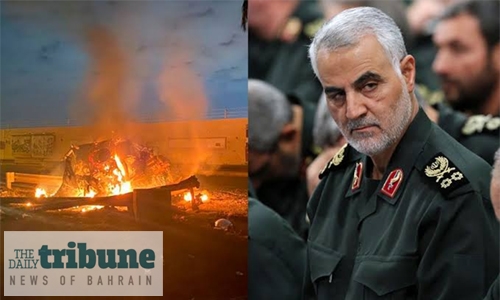Big blow to Iran regime
Qassem Suleimani, head of Iran’s Revolutionary Guard’s foreign operations branch, the Quds Force was killed in a US rocket strike at Baghdad International Airport on Thursday. The head of the Tehran-backed militia Kataib Hizbollah, Abu Mahdi Al Muhandis, was also killed in another strike - ordered by US President Donald Trump.
Their deaths are a potential turning point in the standoff between Washington and Tehran and could draw severe retaliation from Iran and the forces it backs in the Middle East against Israel and US interests. US President Donald Trump has said in a statement at Mara-Lago that the US is not seeking regime change in Iran and is not looking to start a war.
Instead, by carrying out yesterday’s strike, the US leader said America had prevented a war. “Suleimani was plotting imminent and sinister attacks,” Mr Trump said. “We caught him in the act and terminated him,” he added. According to the Associated Press, citing a US official, American troops are on alert to deploy to protect the US embassy in Beirut following the strike on General Suleimani.
The alert has reconfirmed the possibility that Iran may seek revenge against US diplomatic targets. Iran vowed to retaliate to the US air strike at Baghdad airport that killed Qassem Suleimani, the mastermind behind its interventions across the Middle East. Iran’s supreme leader Ayatollah Ali Khamenei declared three days of public mourning for the head of the Quds Force, the overseas operations arm of its Islamic Revolutionary Guard Corps.
Mr Khamenei said the US faced “severe revenge” for Suleimani’s killing, while President Hassan Rouhani called the assassination “an extremely dangerous and foolish escalation” and said the US “bears responsibility for all consequences of its rogue adventurism”. Iran’s top security body, the Supreme National Security Council, met to discuss the attack. Iran also summoned the Swiss charge d’affaires, who represents US interests in Tehran, to lodge a protest.
The Pentagon said Suleimani was killed because he was plotting attacks on US diplomats and forces in Iraq and the wider Middle East. Iraq’s caretaker prime minister Adel Abdul Mahdi said the strike was a “flagrant violation” of the country’s security accord with the US and warned it would “spark a devastating war in Iraq”.
Iraq’s parliament was scheduled to meet on Saturday to discuss the attack, according to Deputy Speaker Hassan Al Kaabi, who said the session would be dedicated to taking “decisive decisions that put an end to US presence inside Iraq”. The Iran-backed Iraqi militia Asaib Ahl Al Haq urged its fighters to be on high alert while the cleric Moqtada Al Sadr reactivated his Mahdi Army, nearly a decade after dissolving the notoriously anti-American force.
In Lebanon, the leader of the Iran-backed Hezbollah group, Hassan Nasrallah, warned of “punishment for these criminal assassins”. The US strike has raised fears of a conflict that could engulf the region and divided opinion among politicians in Washington. In Congress, which was not told in advance of the attack, reaction was split along party lines. “Wow – the price of killing and injuring Americans has just gone up drastically,” tweeted Republican Senator Lindsey Graham, a supporter of President Donald Trump.
The Democratic House of Representatives Speaker Nancy Pelosi said killing Suleimani risked provoking a “dangerous escalation of violence”. “America – and the world – cannot afford to have tensions escalate to the point of no return,” Ms Pelosi said in a statement.
Related Posts

